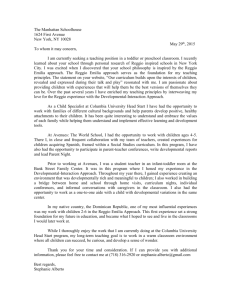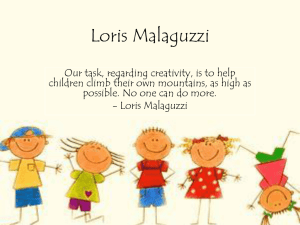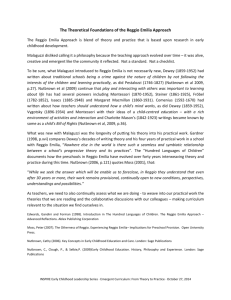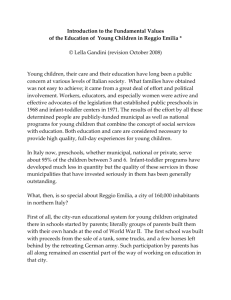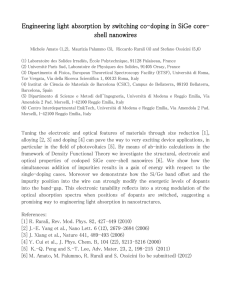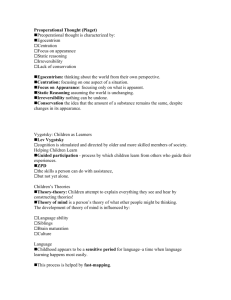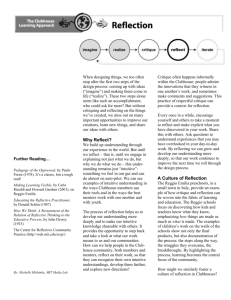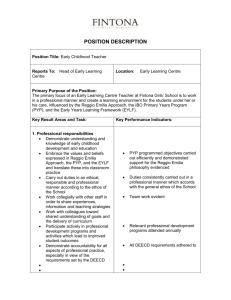OFFICE TRANSLATION FROM ITALIAN TO ENGLISH QUOTE
advertisement
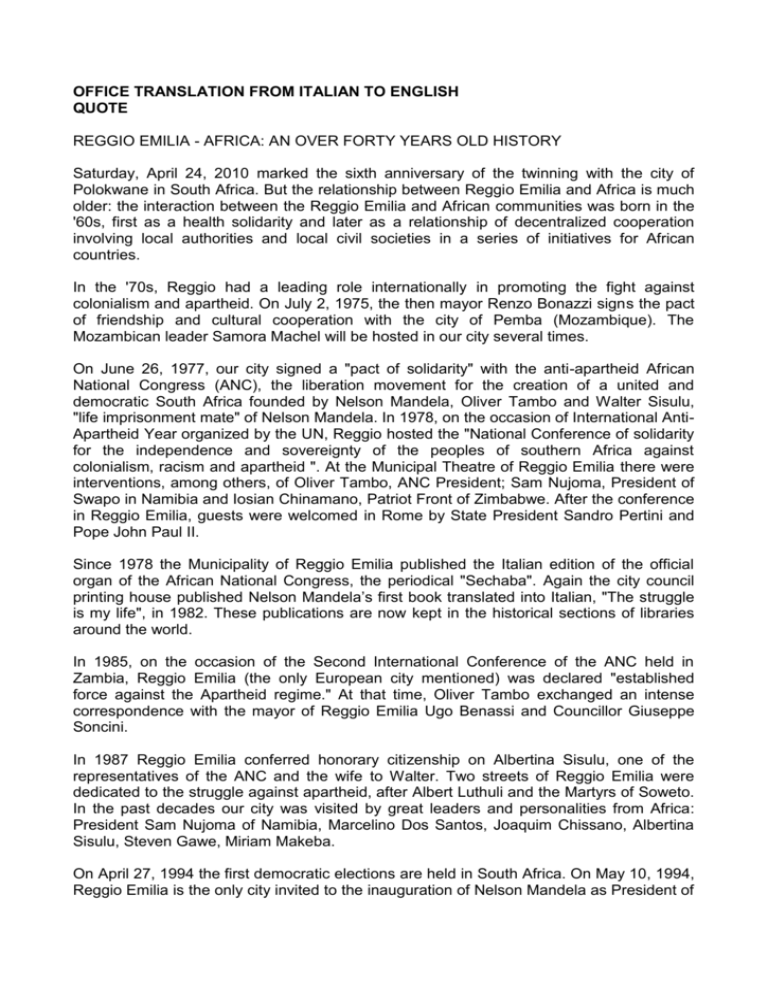
OFFICE TRANSLATION FROM ITALIAN TO ENGLISH QUOTE REGGIO EMILIA - AFRICA: AN OVER FORTY YEARS OLD HISTORY Saturday, April 24, 2010 marked the sixth anniversary of the twinning with the city of Polokwane in South Africa. But the relationship between Reggio Emilia and Africa is much older: the interaction between the Reggio Emilia and African communities was born in the '60s, first as a health solidarity and later as a relationship of decentralized cooperation involving local authorities and local civil societies in a series of initiatives for African countries. In the '70s, Reggio had a leading role internationally in promoting the fight against colonialism and apartheid. On July 2, 1975, the then mayor Renzo Bonazzi signs the pact of friendship and cultural cooperation with the city of Pemba (Mozambique). The Mozambican leader Samora Machel will be hosted in our city several times. On June 26, 1977, our city signed a "pact of solidarity" with the anti-apartheid African National Congress (ANC), the liberation movement for the creation of a united and democratic South Africa founded by Nelson Mandela, Oliver Tambo and Walter Sisulu, "life imprisonment mate" of Nelson Mandela. In 1978, on the occasion of International AntiApartheid Year organized by the UN, Reggio hosted the "National Conference of solidarity for the independence and sovereignty of the peoples of southern Africa against colonialism, racism and apartheid ". At the Municipal Theatre of Reggio Emilia there were interventions, among others, of Oliver Tambo, ANC President; Sam Nujoma, President of Swapo in Namibia and Iosian Chinamano, Patriot Front of Zimbabwe. After the conference in Reggio Emilia, guests were welcomed in Rome by State President Sandro Pertini and Pope John Paul II. Since 1978 the Municipality of Reggio Emilia published the Italian edition of the official organ of the African National Congress, the periodical "Sechaba". Again the city council printing house published Nelson Mandela’s first book translated into Italian, "The struggle is my life", in 1982. These publications are now kept in the historical sections of libraries around the world. In 1985, on the occasion of the Second International Conference of the ANC held in Zambia, Reggio Emilia (the only European city mentioned) was declared "established force against the Apartheid regime." At that time, Oliver Tambo exchanged an intense correspondence with the mayor of Reggio Emilia Ugo Benassi and Councillor Giuseppe Soncini. In 1987 Reggio Emilia conferred honorary citizenship on Albertina Sisulu, one of the representatives of the ANC and the wife to Walter. Two streets of Reggio Emilia were dedicated to the struggle against apartheid, after Albert Luthuli and the Martyrs of Soweto. In the past decades our city was visited by great leaders and personalities from Africa: President Sam Nujoma of Namibia, Marcelino Dos Santos, Joaquim Chissano, Albertina Sisulu, Steven Gawe, Miriam Makeba. On April 27, 1994 the first democratic elections are held in South Africa. On May 10, 1994, Reggio Emilia is the only city invited to the inauguration of Nelson Mandela as President of South Africa. The formalization of the twinning agreement between Reggio and Polokwane in 2004 was thus the culmination of a thirty-year friendship. Since 2000 the international relations with its African partners have been entrusted by the Municipality to “Reggio nel Mondo” (Reggio in the World) by promoting decentralized cooperation projects, awareness-raising and community involvement initiatives, international conferences, support for economic relations with the African continent. REGGIO AND DECENTRALISED COOPERATION The role of Reggio Emilia is recognized nationally and internationally. In particular the website of the Italian Ministry of Foreign Affairs describes with these words the role of our cityin the promotion of decentralized cooperation: "Some Italian local governments, especially small municipalities, have already started international cooperation activities in the 60s of last century. For the most part it consisted of minor solidarity interventions by supporting the work of third world associations or missionaries from their own area. The first example of a more structured co-operation was perhaps the one that was started in those years by the Municipality of Reggio Emilia in northern Mozambique, for regional development and governance of the so-called "liberated zones" by FRELIMO". INTERNATIONAL RELATIONS Over the years the relations designed to support the struggle for the rights to independence and equality in the states of southern Africa have created strong ties between communities both economically and culturally. In 2004 a twinning agreement was signed with the city of Polokwane in South Africa with the subsequent increases of cooperation projects and initiatives that see our area as protagonist. Local authorities, businesses, schools, associations and citizens are working every day to keep these relations alive, a commitment that through the initiatives of the "Reggio Emilia - Africa" incarnates by right the values on which our community has been built and from which now draws inspiration to address the complexities of the contemporary world. BRIEF HISTORY 1977 Pact with the ANC. The journal Sechaba in published in Italian. 1978 National Conference in Reggio Emilia (Municipal Theatre) with delegations of the ANC (led by Oliver Tambo), Swapo (led by Sam Nujoma) and Zanu-Zapu led by Silundika. 1980 The first ship of solidarity departs from Genoa at the presence of Oliver Tambo (with aid for the anti-apartheid and liberation movements in Southern Africa). 1982 Second National Conference in Rome (Parliament’s conference room) with the delegations of the ANC (led by Oliver Tambo), of Swapo (led by Sam Nujoma) and of Zimbabwe, that had just been liberated, led by its Labour Minister Kumbirai Kangai . The Conference is organized by Reggio Emilia. Publication of "The struggle is my life," Nelson Mandela’s first book in Italian. ANC diaries were also printed in two formats. 1983 Reggio Emilia makes all the arrangements for the freedom of Rome to be bestowed on Nelson Mandela in the presence of Alfred NZO, then Secretary General of the ANC. 1983 Reggio hosts a delegation of ANC representatives for them to take part in one of their seminars behind closed doors. Many of them will then become members of the new South African government. Reggio organizes the mailing of postcards to the South African Embassy in Rome for the release of Mandela (I can not remember the year). Isitwalandwe medals with which the ANC honours its most important leaders are minted (from a design by sculptor Giuffredi). 1984 The second ship of solidarity departs from Leghorn at the presence of Sam Nujoma. 1986 Honorary Citizenship to Albertina Sisulu and Desmond Tutu with streets named after the Martyrs of Soweto and Albert Luthuli. Over the years, several personalities of the ANC and independence movements are protagonists of public and institutional meetings in Reggio Emilia. Reggio Emilia is invited to and in attendance of the inauguration of Nelson Mandela as President of South Africa, and his visit to Italy and that of his successor Thabo Mbeki. UNQUOTE Date: 14 July 2011 Source: Comune di Reggio Emilia, press office
